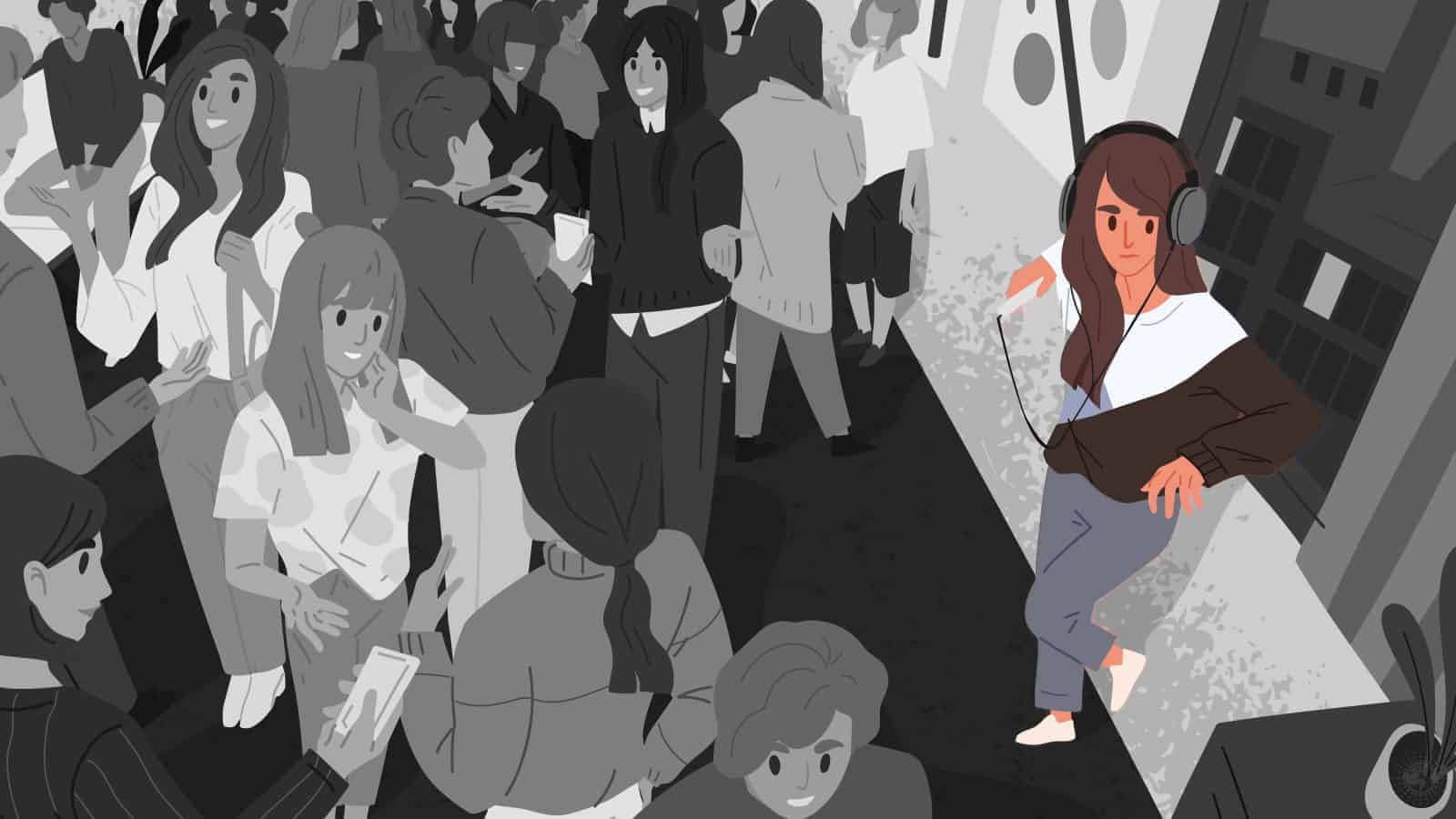Many people experience some degree of anxiety around brand new people. It can be difficult to figure out what to say, how to hold yourself, and how to just act naturally. For some, the process of meeting new people comes easily, but not everyone is so lucky! Indeed, some feel anxious just at the thought of an introduction to someone new.
Anxiety in social situations is far from an unknown concept. Millions of people around the world experience similar sensations every single day. 15 million individuals in America have a social anxiety disorder, and it is the third most common form of mental illness in the country.
While many of the topics we’ll discuss today will have their roots in the psychology of social anxiety disorder, do note that you do not need to have the disorder to be anxious around new people. However, the causes behind these anxious emotions may be similar, on a milder side of the spectrum, to what contributes to the risk of development of social anxiety in general.
It is important to take note of these causes so you can either seek help for them or learn to overcome them yourself! Without further ado, here are some reasons why you feel anxious around new people.
8 Reasons Why You Feel Anxious Around New People
1. Negative Self-Thought
Many people who experience anxiety around new people are mentally steeling themselves against perceived threats. For example, your thoughts may include:
- I don’t think I’m going to fit in.
- What if I embarrass myself?
- People won’t like me.
- I never know what to say.
- I might say something dumb.
- I’m going to make things awkward.
- I don’t have anything interesting to offer.
These types of thoughts make you feel like you’re at risk. When you start taking them seriously, you develop a system of beliefs that are inherently either false or pessimistic. This leads to maladaptive behaviors, and you may want to avoid social situations in order to protect yourself from these risks.
2. Genetics
Research has not yet revealed any sort of gene that determines your risk of social anxiety. However, there is a clear relationship between having socially anxious family members and developing these issues yourself. This indicates that there is some factor of heritability among those who have social anxiety.
Essentially, if your parents have anxiety about social situations, then there is a higher chance that you may develop it, too. This occurs no matter what environment you are raised in. It may be due to genetics or due to exposure to the idea of social fear in growing up. More studies are needed in order to draw definitive or positive conclusions.
3. A Narrow View Of The World
Many people who experience social anxiety of some form do so because their worldview is narrow. You may even actively attempt to narrow it further in order to expose yourself to fewer risks, or simply because it is all too overwhelming for you. You may:
- Narrow your friendship world by choosing to have very few or no friends, or avoiding the act of making new friends
- Narrow your view of the outside world by electing to stay at home or rarely leaving your house, even when invited to
- Inhibit your work world by choosing “safe” jobs that don’t come with any risk or hard work; you may choose “simple” jobs with no chance of performance-based promotions
- Narrow your knowledge world by only doing things you are used to and never learning new skills
This narrowing helps you feel safe – but it’s sure to fill your life with regrets and make it more difficult for you to interact with people around you. You can no longer relate to them, and they’re outside of your narrow scope.
4. Trauma
Plenty of research indicates that trauma is a common root cause for cases of social anxiety. Though people often belittle trauma and assume it can be overcome with positive thinking, that is simply not how it works, and trauma can affect the way your life is lived permanently if you’re not aware of managing or healing from it.
There are many different forms of trauma, but here are the kinds that may lead to social anxiety:
- Moving around frequently during childhood
- Growing up with overprotective or controlling parents
- Domestic violence
- Discrimination due to sexual orientation, gender identity, religion, race, or gender
- Abuse in any form
- The death or loss of a close family member or friend
- Drug addiction or withdrawals
- Parental divorce
- Concerns regarding anxiety left unvalidated, dismissed, or ridiculed by parents
- Social isolation in an excessive or extreme manner
- Bullying
- Being taught that social interactions are very dangerous
- Experiences with mental illness
It’s also important to note that what you don’t view as traumatic today may have been extremely traumatic to a young child. Even so-called mild instances of trauma can cause social anxiety.
5. Brain Structure
According to brain scans, people who experience social anxiety have clear signs in their brain structure that indicate this problem. This means that there is legitimate scientific proof that the anxiety isn’t all “fake” or “made up”. Here are the areas that are different:
· Amygdala
This part of the brain triggers the body’s natural flight-or-fight response through the use of physiological changes. In those with social anxiety, this part of the brain is hyperactive, meaning it sends the body into that panicked mode more easily.
· Prefrontal Cortex
This part of the brain is meant to focus when you experience anxiety, allowing for rational processing that tells you that, logically, there is no threat. This can help you to calm down and diffuse the situation. Those with social anxiety have this reversed – the cortex amplifies the response to stress instead.
· Neurotransmitter Deficiency
Neurotransmitters, commonly known as hormones, are responsible for a lot of our emotional experiences. Those with social anxiety have depleted positive hormones, such as glutamate, dopamine, serotonin, and oxytocin.
6. You’re With The Wrong People
The people you spend your time with can have a huge effect on your emotional state. They can make or break your day, which is why choosing the right crowd to hang out with and the right circles to grow your list of acquaintances is has such crucial value. Here are some examples of the wrong people to hang out with:
· Those Who Don’t Respect Your Boundaries
If the crowd you hang out around doesn’t respect you and your boundaries, it’s easy to feel anxious. You know that chances are, any new people you meet with this group will wind up making you feel uncomfortable or upset. This threat isn’t just perceived – it’s real.
· Those You Can Never Avoid
People who don’t take “no” for an answer, repeatedly try to get their way, and never give you enough space will make you anxious. These people may then introduce you to new acquaintances who behave similarly.
· Those Who Pressure You
If you’re being pressured into social events that you aren’t comfortable with, it’s easy to see why you’d feel anxious. You don’t want to be here meeting all these people, after all!
· Those Who Drain You Emotionally
Toxic people can drain your spirit, leading to a lack of energy to meet anyone new at all. Spending time with people who are so negative and all-consuming can lead to serious symptoms of depression and anxiety. Surround yourself with people who make you feel good, instead!
7. Your Perception Of Your Life’s Timeline
How do you view your life? Do you cling to the past, fear for the future, and have trouble living in the moment? These can all be affecting your ability to socialize. Here’s how.
· The Past
If you’ve had negative experiences with social interaction – and, let’s face it, who hasn’t? – you may feel especially anxious about trying to interact with others again. An inability to process and move on from previous interaction issues can cause you to experience social anxiety.
This is especially true if the negative event is the source of a lot of trauma or pain. The mere act of socializing can then become a trigger for the feelings associated with that event. If this sounds like something you are dealing with, you should seek professional aid in managing your triggers.
· The Present
As previously mentioned, perceived threats in your present situation can cause you to be anxious. This is part of a vicious cycle; the anxiety depletes your energy and takes up your cognitive concentration, which causes you to do the things you were anxiously trying to avoid. This will then only serve to make you more anxious!
· The Future
When you experience negative or hopeless thoughts about the future, such as believing that nothing will ever improve or change for the better, it’s difficult to want to meet new people. What’s the point when you feel like nothing is ever going to work?
Social anxiety is linked to higher risks of depression and depressive symptoms, too. So if your positive thinking has been down the drain lately and you’re anxious around new people, you may want to speak to a professional who can help.
8. Technology
No one can deny the wonders of technology. But like with anything in life, it has its fair share of drawbacks. Here are the ways that technology can negatively affect your positive thinking around new people:
- Everyone is posting the best images of their best selves with carefully-worded captions – a rehearsed snapshot of unattainable perfect
- You spend an excessive amount of time interacting with technology instead of with real people
- You become used to communicating with people online exclusively, leading to new awkwardness in person
- Easy access to all forms of media has tainted your ideas or expectations of friendship or making acquaintances.
 Final Thoughts On Reasons Why You Feel Anxious Around New People
Final Thoughts On Reasons Why You Feel Anxious Around New People
You don’t have to have a social anxiety disorder to experience periods of social anxiety. Anxiety, in general, is a common human emotion, and it’s something that almost everyone will feel at least once in their lifetime, whether this anxiety centers around new people, social interaction, job-related stress, family pressure, or any other nerve-wracking endeavor.
Regardless of whether you have a social anxiety disorder or not, learning to manage these feelings is difficult, but possible. Understanding the triggers and root causes of your anxiety can help you work towards overcoming it. Without self-awareness of the sources of your complex emotions, you can’t resolve or process them.
If you believe you have a social anxiety disorder, speak to a mental health professional who can assist you. And, in addition, if your experiences of anxiety are something you want or need help changing, don’t be afraid to reach out to a therapist, counselor, or other workers in the field of mental wellbeing.














 Community
Community

